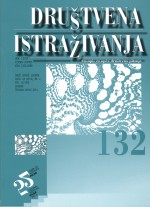Survival Guide to Grand Theorizing and the Central Dogma of Social Science
Survival Guide to Grand Theorizing and the Central Dogma of Social Science
Author(s): Shing-Chung Jonathan YamSubject(s): Epistemology, Philosophy of Science, Methodology and research technology, Social Theory
Published by: Institut društvenih znanosti Ivo Pilar
Keywords: philosophy of social science; epistemology; sociology of knowledge; scope; determinacy;
Summary/Abstract: Grand theorizing and empirical (quantitative or qualitative) research are often separately conducted. In this paper, the separation in question is traced from scholars' differential observance of the yardsticks of the philosophical, scientific and literary/historical methods respectively. The philosophical method relies on deduction and develops into grand theorizing by adding assumptions stemming from life experience, leading to conceptual fluidity. Contrarily, the scientific method relies on experiments, which produce more determinable outcomes as asserted by Popper's (1959) falsificationism. The literary/historical method shares this commitment to determinacy by providing in-depth understanding of spacetime-specific events/meanings. The roles of grand theorizing and empirical research are reviewed: grand theorizing provides categorical schemes, organizes assumptions into perspectives, uncovers hidden assumptions and generates arguments, while empirical research facilitates contextualized comparisons and generates theory. The other side of the story is then presented with the Central Dogma of Social Science, which limits the scope and determinacy of any social understanding with an inverse relationship. The central dogma constrains the possibility of social knowledge and, through institutionalized practice such as the acceptance of journal articles or staff promotion, academic development. For grand theorizing to 'survive', it needs to identify and reembrace its yardstick, which could then lead to confident communication with results generated by other methods.
Journal: Društvena istraživanja - Časopis za opća društvena pitanja
- Issue Year: 25/2016
- Issue No: 2
- Page Range: 199-218
- Page Count: 20
- Language: English

